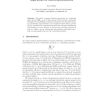Free Online Productivity Tools
i2Speak
i2Symbol
i2OCR
iTex2Img
iWeb2Print
iWeb2Shot
i2Type
iPdf2Split
iPdf2Merge
i2Bopomofo
i2Arabic
i2Style
i2Image
i2PDF
iLatex2Rtf
Sci2ools
102
click to vote
SACRYPT
2001
Springer
2001
Springer
Algorithms for Multi-exponentiation
This paper compares different approaches for computing power products 1≤i≤k gei i in finite groups. We look at the conventional simultaneous exponentiation approach and present an alternative strategy, interleaving exponentiation. Our comparison shows that in general groups, sometimes the conventional method and sometimes interleaving exponentiation is more efficient. In groups where inverting elements is easy (e.g. elliptic curves), interleaving exponentiation with signed exponent recoding usually wins over the conventional method.
Conventional Method | Conventional Simultaneous Exponentiation | Cryptology | Interleaving | SACRYPT 2001 |
| Added | 30 Jul 2010 |
| Updated | 30 Jul 2010 |
| Type | Conference |
| Year | 2001 |
| Where | SACRYPT |
| Authors | Bodo Möller |
Comments (0)

